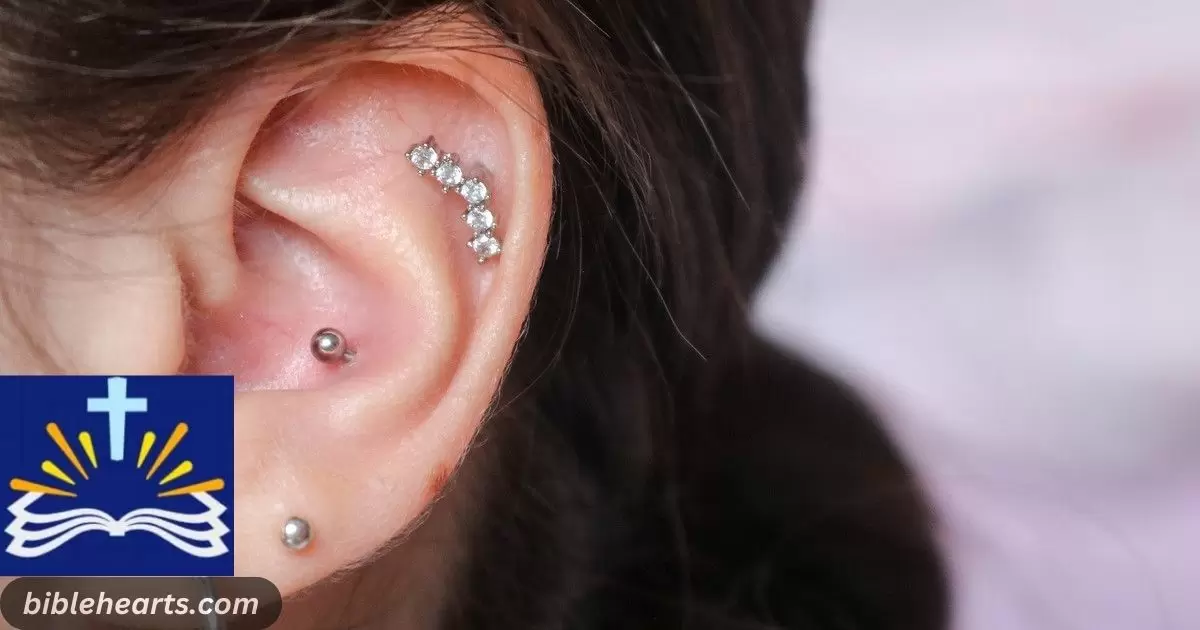“The Bible offers insights into body modifications, including piercings, providing a spiritual perspective on their significance and meaning.”
Body modifications, including piercings, have been practiced across cultures and eras. In the Bible, these practices are mentioned in various contexts, often carrying cultural or symbolic significance.
Understanding these references can provide insight into how these practices were viewed historically and their implications for modern believers. From ancient traditions to spiritual symbolism, examining what Scripture says about piercings can help us navigate our personal choices and cultural practices within a faith-based framework.
Historical and Cultural Context of Piercings
Piercings in the Bible are often mentioned in the context of ancient customs and practices.
- Exodus 32:2 – “So Aaron said, ‘Take off the gold earrings that your wives, your sons, and your daughters are wearing, and bring them to me.’” This verse highlights the use of earrings in ancient Israelite culture.
- Genesis 24:22 – “When the camels had finished drinking, the man took out a gold nose ring weighing a quarter shekel and two gold bracelets weighing ten shekels.” Refers to the use of nose rings as part of a traditional gift and cultural practice.
- Isaiah 3:20 – “The Lord will make the women of Zion eat their own flesh and drink their own blood because of the Lord’s judgment against them. The Lord will strike them with a plague, and their beauty will be taken away.” This passage mentions the adornment practices of women, including their use of jewelry.
- Ezekiel 16:12 – “I put a beautiful crown on your head. I adorned you with jewelry, put bracelets on your arms, and a chain around your neck.” Describes the use of jewelry and adornments in the context of a symbolic relationship between God and His people.
- Judges 8:24 – “Gideon asked the people, ‘I would like to make a request of you: give me the earrings from your share of the plunder.’ (It was the custom of the Ishmaelites to wear gold earrings.)” Highlights the cultural significance of earrings in ancient practices.
Symbolic Meanings of Piercings
Piercings in Scripture can carry symbolic meanings, reflecting deeper spiritual truths.
- Exodus 21:6 – “Then his master must take him before the judges. He shall take him to the door or the doorpost and pierce his ear with an awl. Then he will be his servant for life.” Refers to the practice of piercing as a symbol of permanent commitment or servitude.
- Deuteronomy 15:17 – “Then take an awl and push it through his earlobe into the door. He will become your servant for life. Do the same for your female servant.” Echoes the practice of ear piercing as a sign of lifelong commitment.
- Psalm 40:6 – “Sacrifice and offering you did not desire—but my ears you have opened; burnt offerings and sin offerings you did not require.” The phrase “my ears you have opened” can symbolize openness to God’s will, reflecting a spiritual commitment.
- Isaiah 50:5 – “The Sovereign Lord has opened my ears; I have not been rebellious, I have not turned away.” Symbolizes a readiness to listen and obey God’s commands.
- Galatians 6:17 – “From now on, let no one cause me trouble, for I bear on my body the marks of Jesus.” Though not about piercings, it reflects how physical marks can represent spiritual significance.
Cultural Practices and Their Implications

Understanding the cultural context of piercings helps in discerning their spiritual implications.
- 1 Peter 3:3 – “Your beauty should not come from outward adornment, such as elaborate hairstyles and the wearing of gold jewelry or fine clothes.” Advises on focusing on inner beauty rather than external adornments.
- 1 Timothy 2:9 – “I also want the women to dress modestly, with decency and propriety, adorning themselves, not with elaborate hairstyles or gold or pearls or expensive clothes.” Encourages modesty and simplicity over elaborate adornment.
- 1 Corinthians 11:5 – “But every woman who prays or prophesies with her head uncovered dishonors her head—it is the same as having her head shaved.” Mentions head coverings in the context of cultural practices rather than piercings specifically.
- Song of Solomon 1:10 – “How delightful is your love, my sister, my bride! How much more pleasing is your love than wine, and the fragrance of your perfume more than any spice!” Uses imagery of adornment and beauty to describe love and relationships.
- Proverbs 31:30 – “Charm is deceptive, and beauty is fleeting; but a woman who fears the Lord is to be praised.” Emphasizes the importance of inner character over physical appearance.
Modern Interpretations and Applications

Applying Biblical principles to contemporary practices of body modifications.
- Romans 12:1 – “Therefore, I urge you, brothers and sisters, in view of God’s mercy, to offer your bodies as a living sacrifice, holy and pleasing to God—this is your true and proper worship.” Encourages the use of our bodies in ways that honor God.
- 1 Corinthians 6:19-20 – “Do you not know that your bodies are temples of the Holy Spirit, who is in you, whom you have received from God? You are not your own; you were bought at a price. Therefore honor God with your bodies.” Stresses the importance of honoring God with our physical selves.
- Colossians 2:20-22 – “Since you died with Christ to the elemental spiritual forces of this world, why, as though you still belonged to the world, do you submit to its rules: ‘Do not handle! Do not taste! Do not touch!’? These rules, which have to do with things that are all destined to perish with use, are based on merely human commands and teachings.” Discusses freedom from legalistic rules, which may apply to modern practices.
- Galatians 5:1 – “It is for freedom that Christ has set us free. Stand firm, then, and do not let yourselves be burdened again by a yoke of slavery.” Encourages living freely in Christ while considering how our choices reflect our faith.
- Ephesians 2:10 – “For we are God’s handiwork, created in Christ Jesus to do good works, which God prepared in advance for us to do.” Highlights the idea of being created for good works, including how we present ourselves.
Bible Verses About Having a Good Heart
Personal Conviction and Cultural Sensitivity
Balancing personal convictions with cultural practices and sensitivities.
- Romans 14:5 – “One person considers one day more sacred than another; another considers every day alike. Each of them should be fully convinced in their own mind.” Emphasizes personal conviction and individual conscience.
- 1 Corinthians 10:31 – “So whether you eat or drink or whatever you do, do it all for the glory of God.” Encourages making choices that honor God in all aspects of life.
- Galatians 5:13 – “You, my brothers and sisters, were called to be free. But do not use your freedom to indulge the flesh; rather, serve one another humbly in love.” Advocates for freedom balanced with love and respect for others.
- 1 Corinthians 8:9 – “Be careful, however, that the exercise of your rights does not become a stumbling block to the weak.” Encourages consideration of how personal choices might impact others.
- Philippians 4:8 – “Finally, brothers and sisters, whatever is true, whatever is noble, whatever is right, whatever is pure, whatever is lovely, whatever is admirable—if anything is excellent or praiseworthy—think about such things.” Guides us to focus on what is good and praiseworthy in our choices.
Biblical Guidelines for Body Modifications
Applying Biblical principles to the broader topic of body modifications.
- Leviticus 19:28 – “Do not cut your bodies for the dead or put tattoo marks on yourselves. I am the Lord.” Specifically prohibits certain body modifications, including cutting or tattoos.
- 1 Timothy 4:4 – “For everything God created is good, and nothing is to be rejected if it is received with thanksgiving.” Implies that God’s creations, including our bodies, should be appreciated and used respectfully.
- 1 Peter 3:3-4 – “Your beauty should not come from outward adornment, such as elaborate hairstyles and the wearing of gold jewelry or fine clothes. Rather, it should be that of your inner self, the unfading beauty of a gentle and quiet spirit, which is of great worth in God’s sight.” Focuses on inner beauty rather than external modifications.
- Hebrews 13:4 – “Marriage should be honored by all, and the marriage bed kept pure, for God will judge the adulterer and all the sexually immoral.” While addressing purity, it implies honoring the body in all aspects.
- 2 Corinthians 5:10 – “For we must all appear before the judgment seat of Christ, so that each of us may receive what is due us for the things done while in the body, whether good or bad.” Encourages accountability for how we treat our bodies.
Reflection on Personal Choices and Faith
Encouraging reflection on personal choices regarding piercings and body modifications.
- Matthew 7:7 – “Ask and it will be given to you; seek and you will find; knock and the door will be opened to you.” Encourages seeking guidance and wisdom in personal decisions.
- James 1:5 – “If any of you lacks wisdom, you should ask God, who gives generously to all without finding fault, and it will be given to you.” Suggests seeking divine wisdom for making decisions about body modifications.
- Psalm 37:4 – “Take delight in the Lord, and he will give you the desires of your heart.” Reflects how delighting in God can align our desires with His will.
- Proverbs 3:5-6 – “Trust in the Lord with all your heart and lean not on your own understanding; in all your ways submit to him, and he will make your paths straight.” Encourages trusting God in all decisions, including those about body modifications.
- Colossians 3:17 – “And whatever you do, whether in word or deed, do it all in the name of the Lord Jesus, giving thanks to God the Father through him.” Guides us to make decisions in a way that honors God.
How Should I Approach Body Modifications in Light of Biblical Teachings?
When considering body modifications, including piercings, it’s essential to approach the topic with prayer and reflection on Biblical principles. The Bible offers insights into body adornments, emphasizing inner beauty and honoring God with our bodies.
We should weigh personal convictions, cultural practices, and scriptural guidance.Seek God’s wisdom and consider how your choices reflect your faith and respect for the body as a temple of the Holy Spirit.
Answers To Key Questions.
- Does the Bible explicitly forbid piercings?
- The Bible does not explicitly forbid piercings but provides context and guidelines for body modifications. Some Old Testament passages mention piercings as part of cultural practices, while New Testament teachings focus more on inner beauty and honoring God with our bodies.
- What do the Bible verses about piercings signify?
- Bible verses about piercings often reflect cultural customs and symbolic meanings. They signify commitment, adornment, or spiritual symbolism, but we should interpret them in light of overall Biblical teachings about honoring God with our bodies.
- Are there specific Biblical principles to consider for modern body modifications?
- Yes, principles such as honoring God with our bodies, focusing on inner beauty, and avoiding practices that may cause offense or stumble others are relevant. Seek divine guidance and consider how your choices align with your faith.
- How can I make a decision about piercings that aligns with my faith?
- Pray for wisdom, consult Scripture, and reflect on how your decision aligns with your faith and values. Consider how your choice reflects your respect for your body as a temple of the Holy Spirit and consult with trusted spiritual advisors if needed.
“Is it okay to get piercings for cultural or personal reasons?” - Cultural and personal reasons are valid considerations, but it’s important to ensure that your decision honors God and aligns with Biblical teachings. Reflect on how the choice affects your spiritual life and seek guidance through prayer and Scripture.
Conclusion
Piercings, like other forms of body modification, are addressed in the Bible with historical and symbolic context. Understanding these references can help navigate personal choices in light of faith. The key is to honor God with our bodies, seek His guidance, and consider how our decisions reflect our spiritual values.
By applying Biblical principles, we can make choices that align with our faith and respect the significance of our bodies as temples of the Holy Spirit.

Hi! I’m Lauren Reynolds, a creative spirit and lifestyle blogger dedicated to inspiring others through thoughtful reflections and innovative ideas.










